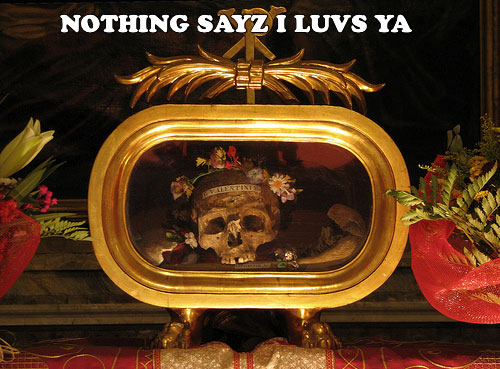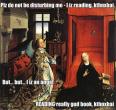Valentine's Day

Nothin' sayz I luvs 'ya like the head of St. Valentine.
The picture is of the relic of St. Valentine of Rome, one of three St. Valentines who were martyrs. The photo was taken from Fr. Lawrence O.P.'s Flickr photstream.
The Catholic Encylopedia says on St. Valentine:
The popular customs associated with Saint Valentine's Day undoubtedly had their origin in a conventional belief generally received in England and France during the Middle Ages, that on 14 February, i.e. half way through the second month of the year, the birds began to pair. Thus in Chaucer's Parliament of Foules we read:
For this was sent on Seynt Valentyne's day
Whan every foul cometh ther to choose his mate.
For this reason the day was looked upon as specially consecrated to lovers and as a proper occasion for writing love letters and sending lovers' tokens. Both the French and English literatures of the fourteenth and fifteenth centuries contain allusions to the practice. Perhaps the earliest to be found is in the 34th and 35th Ballades of the bilingual poet, John Gower, written in French; but Lydgate and Clauvowe supply other examples. Those who chose each other under these circumstances seem to have been called by each other theirValentines. In the Paston Letters, Dame Elizabeth Brews writes thus about a match she hopes to make for her daughter (we modernize the spelling), addressing the favoured suitor:
And, cousin mine, upon Monday is Saint Valentine's Day and every bird chooses himself a mate, and if it like you to come on Thursday night, and make provision that you may abide till then, I trust to God that ye shall speak to my husband and I shall pray that we may bring the matter to a conclusion.
Shortly after the young lady herself wrote a letter to the same man addressing it "Unto my rightwell beloved Valentine, John Paston Esquire". The custom of choosing and sending valentines has of late years fallen into comparative desuetude.





the skull immediately screams:
VANITY!
to me... and how appropriate, now that Valentine's Day is practically bought over by commercialism.
Oh Gerg, To me it spells the exact opposite. Mortality (and in this care martyrdom) cancels out any vanity. The skull says "This is where you shall be soon".
I just think it's funny that they put his name on his head.
O how sweet will the resurrection be, when these dry bones shall have life once again.
Maybe this is just horrible of me to ask this, but why/how are there flowers on the skull itself?
@ Anonymous: Hmm... Probably just some pious devotional thing. Not too sure, though.